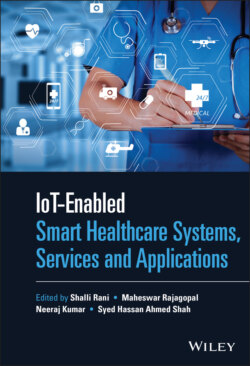Читать книгу IoT-enabled Smart Healthcare Systems, Services and Applications - Группа авторов - Страница 18
1.2.3 Blockchain in Smart Healthcare
ОглавлениеBlockchain is like a powerful synergist to secure healthcare records by providing data integrity and alleviating many challenges in the health sector realm. By attaining, analyzing, and transferring medical information at different levels, blockchain is introduced by researchers to improve the medical field and even aid researchers to unlock genetic codes. Better care, early response of care takers, and timely medicines would be possible if the healthcare system shifted toward electronic and smart gadgets. Effective e‐health systems with quick response contain super‐quality services and privacy for patients. Blockchain makes us able to interact within untrusted circumstances while keeping privacy and security and enabling a reduced cost [19]. To manage electronic records of patients, blockchain has uncountable opportunities. The traditional system is more rapidly catching the advanced technology, making it more convenient and easier to use for doctors and patients both to maintain the privacy and uprightness of the healthcare system using a blockchain framework named Smart Healthcare System (SHS). Due to its transparency, blockchain has extended to many healthcare domains. Data in the form of blocks is related via cryptographic methods and a decentralized database is then shared between all the peers so that anyone can view and access it. Each block is having its unique ID. These IDs, or hashes, are being generated for every incoming block containing new content, and each block carries the hash of every block that follows (hence the name blockchain). Blockchain is also beneficial for the insurance companies and pharmaceutical industry by keeping their records secure and safe. The data once kept in the block remains part of it for further research and diagnosis and make it possible to track the availability of medicines and medical equipment [20].
